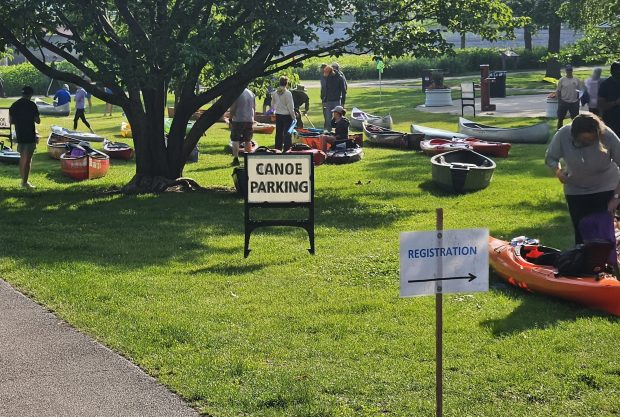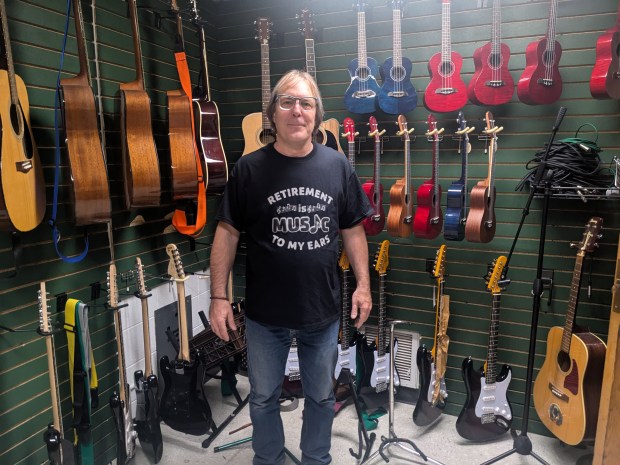A Lutheran minister who runs a university in Bethlehem traveled to Evanston this month to give a north suburban church audience his on-the-ground view of what’s happening in the West Bank, Israel and Gaza.
Rev. Dr. Mitri Raheb, a Palestinian Christian, said that during Holy Week in late April, Israeli airstrikes destroyed the Gaza branch of Dar al Kalima University, the university he founded to promote peace through arts and culture. Only the Bethlehem location, in the West Bank, survives.
“If you go to Gaza today, people are not asking any longer, ‘God, where are you?’ they’re asking ‘God, where is humanity?’” he lamented.
Raheb was joined on the multi-faith speakers’ panel at First Presbyterian Church by Rabbi Brant Rosen, who said zionism runs counter to Jewish values and described his Chicago congregation as anti-zionist; Rami Nashashibi, founder of the Inner-City Muslim Action Network, who spoke of how Jews, Muslims and Christians in the Holy Land lived in peace and friendship and celebrated each others’ holidays prior to Israel’s 1948 founding, and Iva Carruthers, a longtime Evanstonian and activist for African American rights.
Bright Stars of Bethlehem, a U.S.-based nonprofit that supports education and culture for people in the Middle East in the cause of peace, partnered with the church to sponsor the talk.
Displaying a presentation slide with four maps of Israel since 1948 that showed Jewish settlements taking over much of the Palestinian territories, Raheb said Israel is “taking more land and pushing out more Palestinians from Palestine. It is as if Palestine is evaporating.”
He said the conflict is about geography and demography, and that Israel would like to “kick out the Palestinian demography” from the country’s geography, or land.
Showing a slide of an X (formerly Twitter) post by Israeli Prime Minister Benjamin Netanyahu, who wrote, “The Jewish people have an exclusive and unquestionable right to all the areas of the Land of Israel,” Raheb pointed out, “It’s only the Jewish people.
“So I, my family who has been living there for centuries, if not millennia, I have no right to be there. This is what he’s saying.”
Netanyahu also didn’t make any distinction between the West Bank or Israel or Gaza in that post, Raheb commented, saying the prime minister was claiming the whole land exclusively for the Jewish people.
“So we can see how Bethlehem, the city where I live, the little town of Bethlehem is becoming more and more smaller because Israel has taken 86% of the land of Bethlehem for Jewish settlement or colonies,” Raheb observed.
Referencing how the United States is siding with the occupied in Ukraine, Raheb commented, “But not in Palestine. The U.S. is siding with the occupier.”
After reviewing the number of those killed in Gaza, which the Associated Press put at 36,000 on May 26, Raheb noted large percentages of those were women and children. He also noted the Gaza Health Ministry does not distinguish between fighters and noncombatants in its tally.
Raheb said, “There are no universities left in Gaza. There were 11 universities; all of them are totally destroyed.
“Why would you destroy a university? Why?
It would take 100 trucks 14 years to clear the rubble from Gaza, he said, dampening hopes for rebuilding.
“What is the aim of all this? To make life in Gaza unlivable,” he declared. “I think we will have no chance whatsoever to survive. If you destroy 80% of the schools, all the universities, all the hospitals, all infrastructure, water, sewage, electricity, who can survive that? So pushing the people of Gaza out was the aim of this whole assault on Gaza.”
Kris Ducett, executive director of Bright Stars of Bethlehem, told the audience that the Israeli airstrike that destroyed the Gaza campus of the university also killed 30 children and a 24-year-old volunteer named Mohammed. He was doing art therapy with the children, who were panicked due to the ongoing airstrikes, in an attempt to calm them, she said.
The next speaker, Rabbi Brant Rosen of the Tzedek Chicago congregation, said that “the movement of solidarity with Palestinians against the genocide in Gaza is (seeing) a remarkable level of Jewish participation.”
He said he meets regularly with Jews, especially young Jews, who have felt alienated from Jewish life as part of his congregation’s anti-zionist beliefs.
The solidarity they feel with oppressed peoples, especially Palestinians, comes from a place of deep Jewish conscience and the Jewish values they were taught in their families and their religious schools, he said.
“The Jewish community is a very diverse place, like all communities,” he observed, noting some Jews stand by what Israel is doing while others are in deep confusion and pain and are remaining silent.
However, a surge of people “who out of their Jewish conscience, are rising up in solidarity in this moment, out of a place of deep Jewish conviction and conscience,” he asserted.
Telling listeners he wanted to address the issue of antisemitism, he said it can be “a weapon being wielded in a cynical and destructive way toward people who are showing solidarity with Palestinians.”
He encouraged people to recognize that Judaism, a spiritual peoplehood, and zionism, a political movement that started in the 19th century, are two separate, different things.
After the horrors of Holocaust (in the World War II era), “it is to the world’s shame” that many Jewish refugees were not allowed back into their homes or into other countries, he said.
“However, the solution to this issue was not to go into a land and dispossess another people and create a state on their backs, and create what is today the largest refugee population in the world,” he proclaimed.
He called that an essential injustice that has been ongoing ever since.
“It didn’t begin on Oct. 7,” he maintained. “It didn’t begin with the blockade of Gaza in 2006. It began with the ethnic cleansing of 750,000 Palestinians from their homes, Israel’s refusal to allow them to return and establishing a settler-colonial state based on the identity of one particular group of people. And turning Palestinians into refugees, into second class citizens in 1948 Israel, or into people under military occupation in the West Bank after 1967.”
The way forward from here is to understand solidarity as a sacred value, he said, “I see it not only as a political tactic, but as a religious value as a Jew, as a person of conscience.”
A third speaker, Rami Nashashibi, founder of the Inner-City Muslim Action Network, emphasized that Christians, Muslim and Jews got along peacefully prior to Israel’s 1948 founding.
His mother was born in the birthplace of John the Baptist, the village of Ain Kanim, and his grandfather in 1946 welcomed about 250 Polish Jewish refugees fleeing from the Holocaust and took care of them, he said.
It’s a myth that Palestinians did not identify and empathize with Jewish suffering, he said, noting that pre-1948, the Jewish and Muslim communities were intertwined through intermarriage, and that he has Jewish cousins.
A famous author and musician who chronicled early 20th century Palestinian life, a Christian named Wasif Jawhariyyeh, wrote that groups of Muslim, Christian and Jewish friends would celebrate each others’ holidays together. Christians and Jews would even fast during Ramadan alongside their Muslim pals out of friendship.
“That was very common,” he said, noting that the early Zionists wanted a place for a Jewish state but had not agreed upon Palestinian land. At one point, they wanted to put the country in Uganda, he said.
“Palestinians do not have a problem connecting with and celebrating Jewish ancestral connections to the land. There is nothing about that notion that is untrue to us,” he explained. “Moses is mentioned in Koran over 125 times. The stories of the children of Israel are as much our stories as they are anyone else’s stories.”
Iva Carruthers, general secretary of the Samuel DeWitt Proctor Conference, also participated in the panel, emphasizing the need for African American to stand in solidarity with Palestinians. Proctor is an organization within the African American faith tradition focused on justice issues, according to its website.




